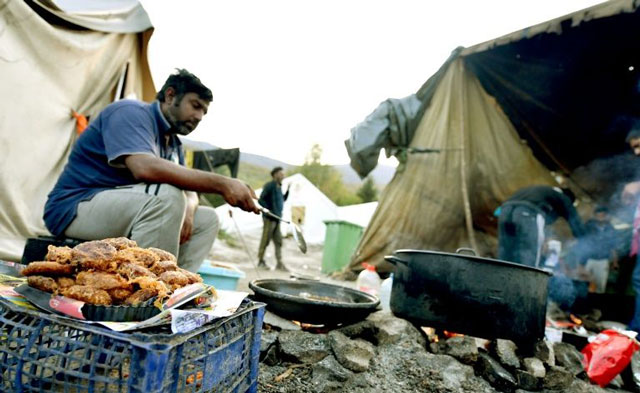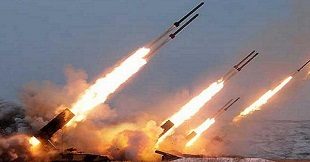
Bihac, Bosnia and Herzegovina | AFP | No running water, putrid portable toilets and surrounding woods littered with land mines — these are the bleak conditions of a camp where hundreds of migrants brace for winter in Bosnia.
“It’s the jungle,” says Mohammad Nawaz, a 30-year-old Pakistani living in the tent-city built on a former garbage landfill in the northwest village of Vucjak.
The camp was set up outside Bihac in June after inhabitants became frustrated with the growing migrant presence.
In a bid for more government help, Bihac’s mayor Suhret Fazlic halted trash collection and cut the supply of water tanks to the Vucjak camp this week.
Residents had to carry plastic bottles to the nearby village and ask locals for water until regional authorities stepped in to pay for the tank supply.
“Here the situation must become absurd for everyone to start doing their job,” the mayor noted.
Situated just across the border from EU member state Croatia, Bihac has become a key transit hub for migrants from the Middle East and Asia who are trying to reach Western Europe.
Their path through impoverished Bosnia became a major one after northern Balkan routes towards Hungary were shut in 2016 following Europe’s migrant crisis.
More than 50,000 people are estimated to have entered the Balkan state over the past two years.
While most eventually move onward, pushbacks by Croatian police are common, leaving many migrants marooned in the Bihac region for long periods of time.
Nawaz, one of 700 migrants in the Vucjak camp, describes feeling penned in a camp that has been roundly criticised by international observers for inhumane conditions.
Saying he lacks food and money, the 30-year-old told AFP he runs into “problems” with police if he tries to go to the city eight kilometres (five miles) away, or if he makes a break for the border.
– ‘Absolutely inappropriate’ –
The international community objected to the Vucjak camp from the start, underscoring the dangers of its location on a former landfill and proximity to active mines from Bosnia’s 1990s war.
This month the UN reiterated “grave concern over the on-going relocation of migrants, including asylum seekers, to the Vucjak site.”
The location “is absolutely inappropriate and inadequate for accommodating human beings”, said the UN’s Special Rapporteur on the human rights of migrants, Felipe Gonzalez Morales.
Ali Raza, a 24-year-old Pakistani who said he has been at the camp for three months, agrees.
“I am not an animal, I am a human being. The doctor hasn’t been here for ten days,” he said in exasperation.
The Bihac region hosts between “between 6,000 and 7,000 migrants” in all, said interior ministry official Nermin Kljajic.
Around half live in four camps run by the International Organization for Migration, he said.
While groups periodically depart in bids to cross the Croatian border, their spots are taken by around 150 new migrants arriving each night by train from Sarajevo.
This week, an AFP journalist saw police halt new arrivals at a station 50 kilometres (31 miles) from Bihac in a fruitless attempt to keep them away.
After being forced off the train, the wearied travellers continued their journey by foot.
– Winter is coming –
Bosnian authorities say they want to move the camp before winter hits but have been unable to agree on a new location.
The European Union has given Bosnia 34 million euros ($37.8 million) since 2018 to help manage the migrant crisis and the Red Cross distributes clothes and two meals a day in Vucjak.
The only electricity comes from a generator that charges mobile phones, crucial devices for migrants to chart their journeys west.
The Council of Europe Commissioner for Human Rights, Dunja Mijatovic, criticised the camp’s “deplorable” conditions, and warned that “with winter coming, the situation cannot but worsen.”
As cold temperatures draw near, makeshift sites like Vucjak risk becoming a humanitarian crisis.
“It is good to bring water, to collect garbage. But who will take care of the large number of migrants with scabies, tuberculosis and hepatitis?” local manager Selam Midzic asked.
 The Independent Uganda: You get the Truth we Pay the Price
The Independent Uganda: You get the Truth we Pay the Price




